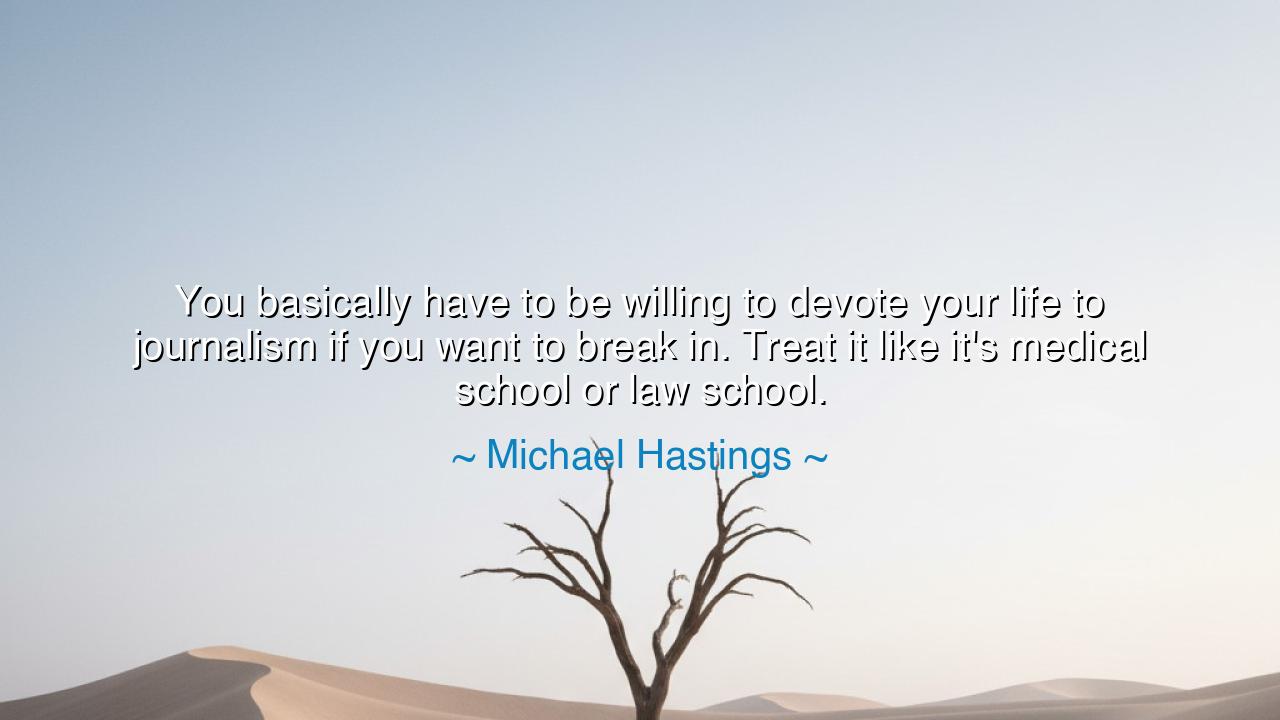
You basically have to be willing to devote your life to
You basically have to be willing to devote your life to journalism if you want to break in. Treat it like it's medical school or law school.






“You basically have to be willing to devote your life to journalism if you want to break in. Treat it like it's medical school or law school.” Thus spoke Michael Hastings, a truth-teller whose pen burned with courage and whose words cut through illusion like a blade of light. In his voice, we hear not mere advice to the aspiring journalist, but a commandment to the seeker of truth in any age. For he reminds us that journalism, like medicine or law, is not a pastime but a calling — a sacred craft that demands sacrifice, vigilance, and an unyielding love for truth itself.
To devote your life is no small thing. It means to surrender comfort for conviction, leisure for labor, and sometimes even safety for honesty. Hastings knew this not as theory, but as lived experience. He walked among soldiers and politicians, in deserts and warzones, to uncover what power sought to hide. His words were forged in the fires of conflict and conscience. And so when he said, “Treat it like medical school or law school,” he was not comparing merely the difficulty of journalism to these professions, but the discipline — the total immersion of one’s being into the pursuit of mastery and meaning. Just as the healer studies the body and the lawyer studies the law, the journalist must study the world — its wounds, its lies, its quiet triumphs — and dedicate every waking hour to understanding it.
In the ancient world, the scribes and chroniclers were seen as guardians of civilization. Their ink preserved the memory of empires; their words held kings accountable to justice and posterity. To them, truth was a sacred trust, not a commodity. So too did Hastings see his craft. His writing was not entertainment — it was service. He believed that a journalist’s role was to bear witness, to speak for those silenced by fear or forgotten by power. His life and death both testify to this truth: that real journalism demands not just skill, but courage — the courage to tell the story no one wants told.
When Hastings wrote his famous article that brought down a general, he proved that the pen, when wielded with integrity, still holds dominion over power. Yet his triumph was not without cost. He became both celebrated and condemned, revered and reviled — a reminder that devotion to truth often makes one an exile among the comfortable. But this, too, is part of the ancient rhythm. The prophets, the philosophers, the reformers — all were misunderstood in their time. The one who speaks truth to power rarely finds peace, but always finds purpose.
In his quote, Hastings also hints at something deeper — that journalism, like medicine, is an act of healing, and like law, an act of justice. The journalist diagnoses the sickness of society, exposing what festers in the dark. They are surgeons of truth, cutting away the rot of corruption and deceit. But such work is grueling and often thankless. It demands not just talent, but discipline — the kind of relentless study and endurance that forms great healers and jurists. To treat journalism like “medical school or law school” is to see it as a vocation that shapes the mind, tests the soul, and demands the whole of one’s life.
Consider the story of Ida B. Wells, the fearless journalist of the nineteenth century, who risked her life to expose the horror of lynching in America. Her printing press was destroyed, her name vilified, yet she continued. She treated her craft as sacred duty, her pen as weapon and shield. Like Hastings, she understood that to write truth is to challenge the gods of injustice — and to do so, one must live as a warrior, not a spectator. Her legacy, like his, reminds us that devotion is the price of impact, and sacrifice the seed of change.
So, my children, take this teaching to heart: whatever your calling, give it the fullness of your being. If you would write, then bleed onto the page. If you would seek truth, then be willing to suffer for it. Do not mistake passion for discipline; the former burns bright and dies, the latter burns steady and endures. Treat your pursuit — whether in words, in healing, or in justice — with the seriousness of the scholar and the reverence of the saint.
For in the end, Michael Hastings’s words are not only about journalism, but about the nature of greatness itself. To achieve mastery, you must surrender mediocrity. To reveal truth, you must risk comfort. To honor your craft, you must live for it. So let your work become your prayer, your devotion, your offering to the world. For those who give their lives to their calling — whether writer, doctor, or defender — never truly die. Their words, their deeds, their truth endure beyond them, lighting the path for all who follow.






AAdministratorAdministrator
Welcome, honored guests. Please leave a comment, we will respond soon